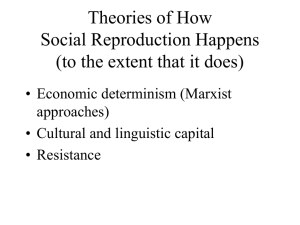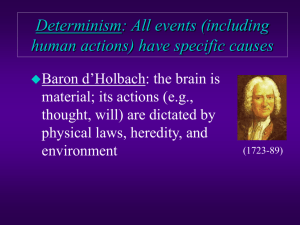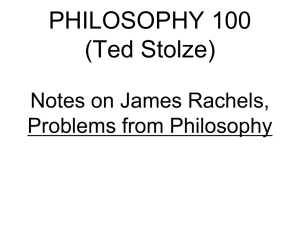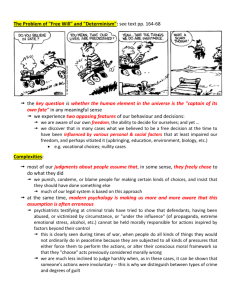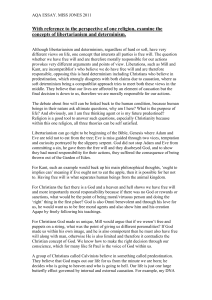presentation source
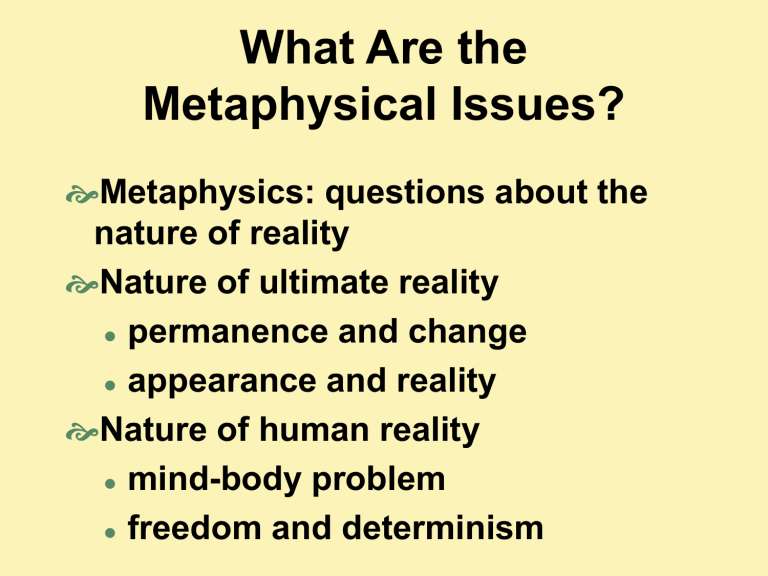
What Are the
Metaphysical Issues?
Metaphysics: questions about the nature of reality
Nature of ultimate reality
permanence and change
appearance and reality
Nature of human reality
mind-body problem
freedom and determinism
Metaphysical Positions
Monism
Materialism
Idealism
Dualism
Conceptual Tools for
Metaphysics
Simplification of complexity
Ockham's razor
Inference to the best explanation
used by both science and metaphysics
Ontology
Questions about what is most fundamentally real
Fundamental reality
that upon which everything else depends
that which cannot be created or destroyed
Metaphysical Categories
Things that are not real: eliminativist strategy
Realities reducible to more fundamental realities: reductionist strategy
Things that are fundamentally real
Plato’s Metaphysics
Nonphysical realities: Platonic
Forms
Degrees of reality
Allegory of the cave
Propositions of the Mind-
Body Problem
The body is a physical thing
The mind is a nonphysical thing
The mind and body interact and causally affect one another
Nonphysical things cannot causally interact with physical things
These four statements cannot all be true
Positions on the Mind-Body
Problem
Mind-body dualism
Interactionism
Parallelism
Occasionalism
Physicalism
Identity theory (reductionism)
Eliminativism
Functionalism
Descartes’s Arguments for
Mind-Body Dualism
Principle of the nonidentity of discernibles
Argument from doubt
• Discourse on the Method
Argument from divisibility
Argument from consciousness
• Meditations on First Philosophy
The Cartesian Compromise
Division of reality
• Science’s authority in the physical realm
• Religion’s authority in the spiritual realm
Interactionism
Physicalism: An Alternative to Dualism
Four problems of dualism:
Where is the mind-body interaction?
How does the interaction occur?
Conservation of energy?
Success of brain science?
The Positive Case for
Physicalism
Correlation between mental events and brain states
Consciousness may be a by-product of low-level physical processes
Forms of Physicalism
Identity theory, or reductionism
Mental events are identical to brain events
Brain research will answer all questions about the mind
Eliminativism
Labels traditional psychological theories as folk psychology
No beliefs or desires, only brain states and processes
Functionalism
Minds are constituted by a certain pattern or relation between the parts of a system
Minds have multiple realizability
Mental states are defined in terms of their causal role (how they function)
Artificial Intelligence
Can computers think?
Turing test
Strong AI thesis: an appropriately programmed computer can think
Weak AI thesis: a computer can only simulate mental activities
Issues of Freedom and
Determinism
How do nature/nurture, heredity/ environment affect us ?
consider identical twins, separated at birth
What is the origin of our actions?
What implication does determinism have for moral responsibility?
Types of Freedom
Circumstantial
ability to do what we choose
freedom from external forces
Metaphysical
free will
relates to our internal condition, not external forces
Most philosophy is concerned with metaphysical freedom
Positions on Freedom
Determinism
Libertarianism
Incompatibilism
Hard determinism
Compatibilism
Hard Determinism
Problems with libertarianism
Positive arguments for determinism
Denial of the possibility of moral responsibility
Objections to Libertarianism
Conflicts with the scientific world view
Requires the problematic notion of uncaused events
Fails to explain that we can influence other people's behavior
The Positive Case for
Determinism
1. Every event, without exception, is causally determined by prior events
2. Human thoughts and actions are events
3. Therefore, human thoughts and actions are, without exception, causally determined by prior events
Determinist Thinkers
Spinoza
pantheism
free will is an illusion
B.F. Skinner
radical behaviorism
reduction of all mental terms to scientific statements about behavioral probabilities
Tenets of Libertarianism
We are not determined
We do have freedom of the will
We have the capacity to be morally responsible for our actions
Objections to Determinism
Determinism makes an unwarranted generalization from a limited amount of evidence
Determinism undermines the notion of rationality
Determinism confuses methodological assumptions of science with metaphysical conclusions
Types of Antideterminism
Indeterminism
Some events are uncaused
Agency theory
Event-causation
Agent-causation
Radical existential freedom
Jean-Paul Sartre
Arguments for
Libertarianism
Argument from introspection
Argument from deliberation
Argument from moral responsibility
Compatibilism
Soft determinism
We are both determined and morally responsible for our actions
Voluntary actions take place when the determining causes reside within the agent, not externally
Hierarchical Compatibilism
(Frankfurt)
First-order desires
Second-order desires
Second-order volitions

